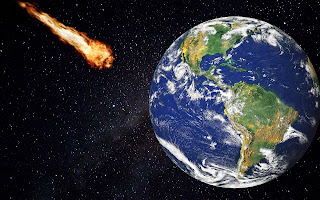For a while there, we could all write about climate change as if it were still coming and might possibly be avoided if people were exhorted sufficiently to do x, y and z to reduce their carbon footprint and governments were urged to own up to their policy paralysis.
I miss those days. Now it all feels just so much more
right-now, a black cloud of fear and dread carried on waves of intense media
coverage of weird weather events everywhere in the world. How does an average
writer contribute helpfully to the dialogue once things have reached this
state?
“What solutions would you propose?” a Facebook connection asked
me recently after a post I did on the crappy legacy we Boomers are leaving
behind for coming generations.
Well, isn’t that just the million-dollar question? Who DOES
have the solutions for the gigantic issues of these times? And how will they
ever be enacted in a world that seems incapable of taking collective action
even as existential crisis looms?
We have wasted so much time already, first debating whether
climate change even existed and then splintering into our various belief camps as
to who was the most to blame and how they should be made to atone. As usual, we
have let politicians use our longing for solutions that don’t require anything
of us to take us down a number of garden paths during these years of
finger-pointing.
The cost of inaction is staggering. Ben Parfitt and Marc Lee write that in 2021 alone, heat, fire and floods cost the BC economy at least $10.6 billion, and possibly almost double that.
At this point, does it even matter how we got here, other
than to give us context for prioritizing action? Sure, rich countries are
rightly going to have to be on the hook for more money into the communal pot
after enjoying decades of guilt-free emissions that fueled our economic
dominance, but let’s just presume that and get going. What we really need to
talk about is how we’re going to stop this train wreck.
I take heart from the scientists, because they’ve been studying
this one for years even while the rest of us were still arguing about whether
climate change even existed.
Devin Todd, Researcher in Residence at the Pacific Institute
for Climate Solutions at the University of Victoria, wrote in the Globe and
Mail recently of the need to keep the pressure on around reducing emissions
from fossil fuels while also figuring out a plan for emerging “negative
emission” technologies that can remove and neutralize greenhouse gases in the
atmosphere.
The technologies
are fascinating: machines that suck carbon dioxide from the air with
chemical sponges; changing ocean chemistry so it draws down more C02;
direct-air capture with the C02 then stored deep underground.
I read about what the scientists are coming up with and feel
hope, sort of like you do at that part in the epic disaster movie where the
brave astronaut-physicist-miracle person is heading into space to stop the
asteroid from striking the Earth and destroying every living thing. Please save
us, heroic scientists.
But then I look at the glacial pace of climate action at the
hands of so many of the world’s governments and the deeply compromised agendas
of pretty much everyone, and wonder how the fraught and fragile democracies of
the 21st century will ever get it together to make any plan, let
alone execute it.
Not that it’s all on government. This historic period of
climate change is about us, the eight billion people who divide up into people
who buy stuff, people who make stuff, and people eagerly awaiting a day when
they can do either of those things if they can only get out of poverty.
Those of us with money and those of us with cheap labour have
entangled our needs and wants through unfettered trade. As Crawford Kilian
noted in a
recent Tyee column, Canada’s coal fuels China’s manufacturing, which then
comes back as imports of all the stuff that Canadians can’t stop buying. Think
of all the emissions that vicious circle of want costs the world.
So here we are, collectively entangled in the climate crisis,
hooked on economic growth, wishing with all our hearts that someone’s going to
pull a rabbit out of the hat and we’ll all get back to normal. Except when
everybody’s wishing and nobody’s acting, not much gets done.
Are we even capable of acting collectively? It’s not a
hopeful sign when our countries can’t even come out of a global climate meeting
with a few cheery accomplishments to lift our spirits. Perhaps poor countries think
it was a win to extract a
vague promise from rich countries to give them more money as climate change
tears everything apart, but that is hardly a climate-change solution.
How do we come together as a world when so much sets us
apart? It’s the question for these times. But if we’re still thinking that
somebody else is prepping a hero for the big save and the rest of us are fine
to cruise along like always, best to give that one up.
The world will do what it does, and I guess we’ll see if
that’s anything at all. But what will YOU do?

No comments:
Post a Comment